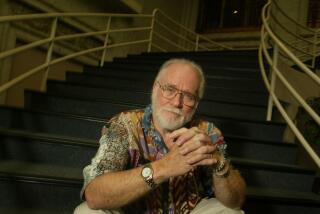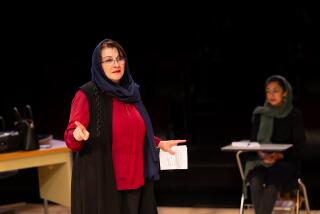Adrian Noble, urbane and puckish in San Diego
If it weren’t for Adrian Noble’s poor eyesight, Southern Californians might not be gaining new insights into William Shakespeare this summer.
As a lad growing up in Chichester, England, Noble, the future artistic director of the Royal Shakespeare Company, was afflicted with myopia. One day when his optician was “poking about in my eye,” he told Noble about his improbable plan to start a world-class theater festival right there in Chichester, featuring some of Britain’s best actors.
It sounded a bit barmy. But a few years later, in 1962, the Chichester Festival was born, and Noble was among the first audiences to see a who’s who of England’s stage royalty taking on multiple roles in a variety of plays, Shakespearean and otherwise.
“I don’t think he realized quite what he’d done, actually,” Noble said recently of the now legendary impresario-optician, Leslie Evershed-Martin. “ Laurence Olivier. Ralph Richardson. Edith Evans was there. Michael Redgrave. Maggie Smith. I mean, it was just astonishing.”
From that youthful exposure, Noble began to develop a lasting appreciation for the concept of a theater company that could tackle several plays at once in rotating repertory and in which there were no small parts, only small actors. (For the record, Noble counts many very big actors among his friends and colleagues, including the Oscar winner he refers to as “Danny Day-Lewis.”)
Now he’s bringing that time-honored idea to San Diego’s Old Globe, where he’s serving as artistic director of the venue’s annual summer play festival. This year’s lineup consists of Shakespeare’s “The Taming of the Shrew” and “King Lear,” along with Alan Bennett’s 1991 “The Madness of George III,” a fictionalized biographical drama about the 18th century British monarch whose autocratic hubris sparked the American Revolution. Ron Daniels directs “Shrew” and Noble the other two plays, all performed through September in the outdoor amphitheater at the Old Globe’s picturesque campus in San Diego’s Balboa Park.
Repertory theater is a way of performing, and experiencing, plays that’s regrettably rare in the United States, mostly because of the difficulty and prohibitive cost of getting several dozen actors, designers and technicians to sign on to a months-long commitment. Noble, whose recent directing credits include opera productions in Paris and at New York’s Metropolitan Opera as well as the hit musical “Chitty Chitty Bang Bang” in London’s West End, believes that the rewards of repertory festivals are as great for audiences as for actors.
“It gives an audience a chance to get to know a company of players. That’s the nice thing,” he said. “And sometimes there’s a dialogue between the plays, so there’s a dialogue between ‘King Lear’ and ‘The Madness of [George III].’ And there’s a dialogue in a way between ‘King Lear,’ one of the great middle to late tragedies, and ‘The Taming of the Shrew,’ one of the early lighter comedies. It gives an audience a bit of a sense of occasion.”
To heighten that dialogue, Noble is setting “Lear” in 1776 rather than its usual much older milieu. As the production advances the setting gradually will update to around the time between the 20th century’s two world wars, offering a sub-textual commentary on how concepts of monarchy and leadership have evolved through the ages.
Widely regarded as a meticulous student of Elizabethan verse, Noble, 59, has made Shakespeare’s works as well as his approach to ensemble-building a cornerstone of his career.
That’s hardly surprising for a man who devoted 13 years of his life to running the world’s premier Shakespeare company (controversially, at times), who knows the author’s oeuvre inside-out, and who last year published a book, “How to Do Shakespeare,” that fuses personal anecdotes with practical, hands-on knowledge and astute line readings that illuminate Shakespeare’s technique.
But Noble’s reverence for the Bard’s humanistic universality goes even deeper.
“I think Shakespeare is one of the great civilizing influences in the world. I think he’s one of the great unifiers of mankind,” said Noble, who once directed “Twelfth Night” in Japan at a time when there were more Shakespeare productions in Tokyo than in London.
“They [the Japanese] just love him. So I think having Shakespeare in a life is a very, very important element.”
Noble credits Shakespeare with inventing the structure of the modern repertory company. By writing plays for his own troupe (known as the King’s Men, after their patron, King James I), Shakespeare allowed a specific group of actors to mature and take on more ambitious roles over time, Noble said, while the playwright himself grew more artful and sophisticated in his plotting and poetry.
“Lear” is a good play to build a company around, Noble said. Because it contains nine or 10 really good parts, plus a number of solid secondary roles, it allows him to assemble a core group of actors of different ages and experience levels, broadening the casting possibilities for other plays.
Noble’s new Southern California playmates appear to have embraced his philosophy of the how and why of creating acting companies. Robert Foxworth, the veteran performer who’s scaling the Mt. Everest title role in “Lear” as well as the more manageable part of the would-be healer Dr. Willis in “Madness of George III,” said that when Noble communicates with the Old Globe cast and crew he conveys an artistic vision that extends beyond this year’s three festival plays.
“He actually started out the first few days of rehearsals doing some exercises with us, finding a sense of unity and give-and-take,” Foxworth said by phone last week while weaving his car along the 405 en route to San Diego. “I know if any part of us come back for the next festival season, we’re going to be carrying not only these ideas about how to do Shakespeare but how to do theater.”
Lou Spisto, the Old Globe’s executive director, said the theater’s audiences “love the idea of the festival because they love the connection with the actors.” Two main challenges in mounting three plays with a team of 25 performers, five designers and multiple directors, Spisto said, are casting a versatile acting company and constructing a set design that’s “flexible and adaptive,” so the audience will feel that it’s watching three distinct-looking shows.
Spisto reckoned that Noble would be the right man for the job after seeing the director’s staging of “Hamlet” at the Stratford Festival of Canada a few years ago. Noble is replacing Darko Tresnjak, who went freelance after six seasons leading the San Diego event.
“I think Adrian, there’s a confidence he has in what he’s doing, which is not arrogance but is simply knowing what you’re doing, and that comes across,” Spisto said. “He’s having a great time, and it shows.”
Noble’s Old Globe gig represents a sort of reunion with the Bard after several years of separation that followed his tempestuous resignation from the RSC in 2003.
As Noble describes that parting, in his customary discursive mode — even-toned, urbane, puckishly humorous — the time simply had come for him to move on to new things.
“I loved it at first,” he said. “But I’ll tell you something that happened to me. When I took over the company in 1990, probably 60 to 65 percent of my time was spent on artistic matters — directing, reading plays, working with actors. By the time I left it had been reduced to between 25 and 30 percent.”
Toward the end of his tenure, Noble drew fire from labor unions for planning to shorten RSC actors’ contracts and shrink the company. Other proposals, including his desire to quit the Barbican, the hulking London arts complex that then housed the RSC, earned him a thrashing from the British press and spurred dissent from some prominent actors, the kind with words like “Sir” and “Dame” attached to their names.
His final heresy, however, was calling for the demolition of the RSC’s barn-like 70-year-old theater in Stratford-upon-Avon, Shakespeare’s birthplace, and to replace it with a cozier, more audience-friendly facility.
“Leaving the RSC was very, very traumatic,” he said. “It became a bit bloody. … And of course the press loves controversy.”
Since then, Noble has pursued a successful freelance career. But he hadn’t done Shakespeare until his “Hamlet” production in Canada. The challenge of combining different stage and acting traditions in that show helped reignite his relationship with the Bard.
“There was a fascinating marriage between the Shakespearean tradition that I grew up in, and I developed myself, and a more North American Method-based, a Stanislavskian-based tradition,” he said. “And then Lou asked if I’d become artistic director of the Shakespeare festival here.”
So there he was, on a late spring day, a fedora pulled over his head to block the sun, white dress shirt tucked into gray slacks, black-and-white striped socks plunged into black sandals as he shuffled out of an afternoon rehearsal.
It was a scene that the greatest writer in the history of the English language might’ve recognized: theater being made out of something as simple as words, space and a group of actors assembled outdoors on a balmy afternoon.
“One of the things that I always find very moving is that the frontispiece of the First Folio lists the actors,” Noble said, referring to the collection of Shakespeare’s plays published in 1623.
“There’s 26 of them. And if you analyze them, you will find that there are the leading men, there are the older character men, the younger character men, the character women.
“And that’s sort of what one is looking for when one is creating any Shakespeare company, whether it’s in Stratford-upon-Avon or San Diego. It kind of doesn’t make any difference, really. So we look for that breed of people. Except we have real women rather than men playing girls!”
More to Read
The biggest entertainment stories
Get our big stories about Hollywood, film, television, music, arts, culture and more right in your inbox as soon as they publish.
You may occasionally receive promotional content from the Los Angeles Times.







